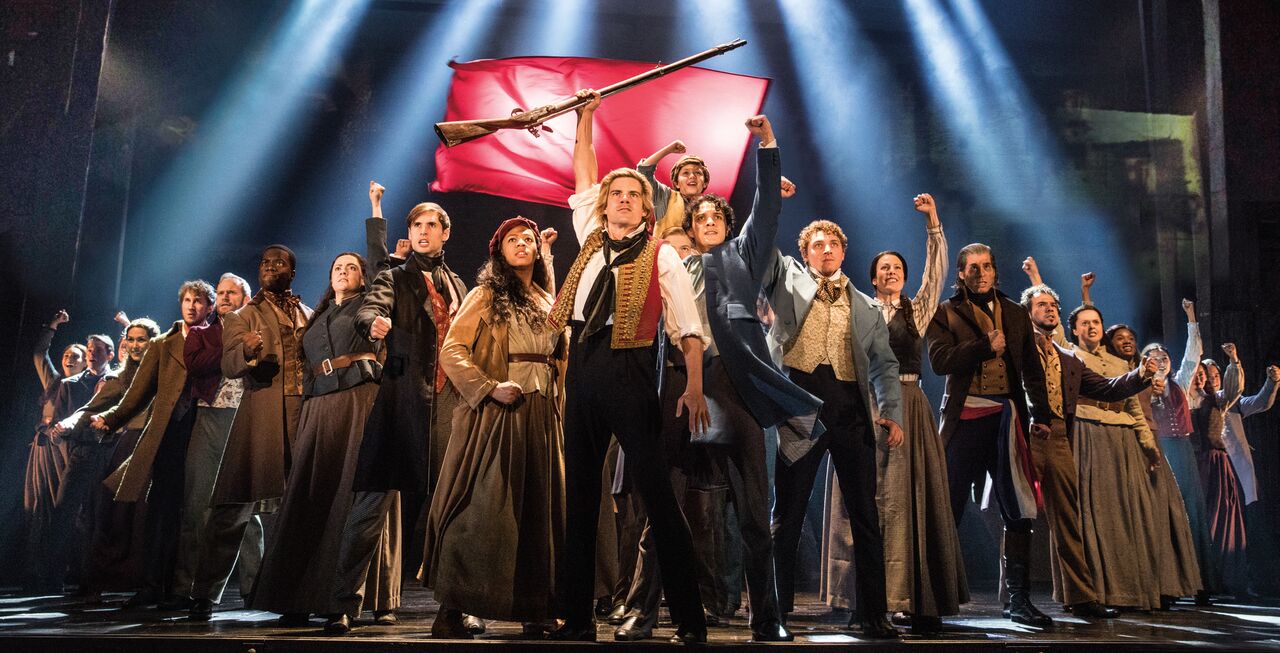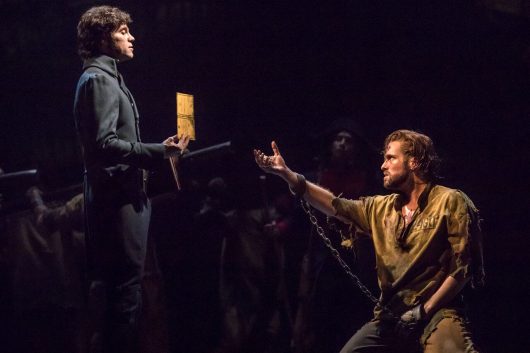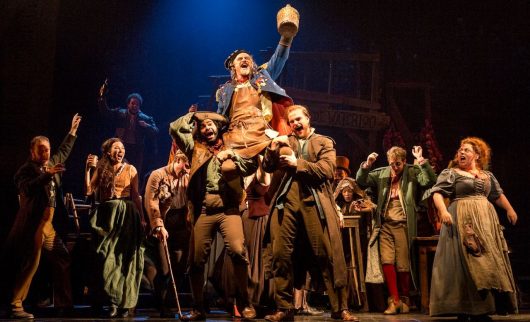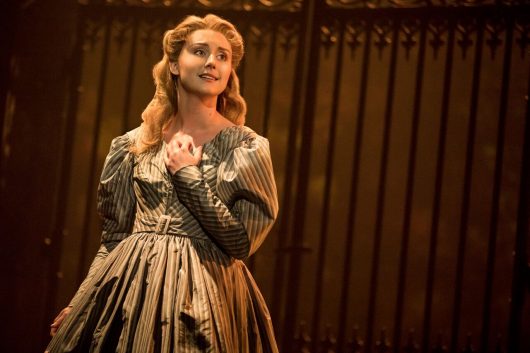Les Miserables still moves masses to tears
Posted on July 4, 2018 By Colin MacLean Entertainment, Front Slider, Theatre
 Just when you thought you’d never see their like again – they’re back. Those passionate French revolutionaries are storming the barricades, marching in place and lustily singing of a glorious tomorrow that will never come.
Just when you thought you’d never see their like again – they’re back. Those passionate French revolutionaries are storming the barricades, marching in place and lustily singing of a glorious tomorrow that will never come.
When Les Miserables was in Edmonton last, circa 2013, just pausing on its way to a triumphal return to Broadway, it boasted a new, more dramatic staging – a slightly downsized and digitized version of the original that opened in 1985 – and went on to become the world’s most successful musical. The massive sets were replaced by projections of moody drawings of the time by the author, Victor Hugo. The effective projections also take us below the streets of Paris to the sewers where Valjean rescues Marius.
The new version really was an improvement on the original which was beginning to show signs of aging.
 So rest easily, there’s life on the old barricades left. At the Jubilee Auditorium until July 8 in a Broadway Across Canada production, this Les Miz will still leave you overcome with lush melody and stirred by emotion – and it’s still faithful to the spirit of Hugo’s sprawling novel. Like Dickens, Hugo’s work was fictional, but based on his view of the evils of the society of his time. He thundered against social injustice, posing a redemption through love and the power of destiny. Part of the success of the musical was that the message didn’t get lost in a rosy, romantic glow and enveloping music. The minor miracle of Les Miz is that despite the flash and show, the basic story prevails as intimate and real. The existential struggle of the escaped convict and the relentless pursuing policeman remains at the beating heart of the drama.
So rest easily, there’s life on the old barricades left. At the Jubilee Auditorium until July 8 in a Broadway Across Canada production, this Les Miz will still leave you overcome with lush melody and stirred by emotion – and it’s still faithful to the spirit of Hugo’s sprawling novel. Like Dickens, Hugo’s work was fictional, but based on his view of the evils of the society of his time. He thundered against social injustice, posing a redemption through love and the power of destiny. Part of the success of the musical was that the message didn’t get lost in a rosy, romantic glow and enveloping music. The minor miracle of Les Miz is that despite the flash and show, the basic story prevails as intimate and real. The existential struggle of the escaped convict and the relentless pursuing policeman remains at the beating heart of the drama.
Les Miz (the musical) has moved on to become timeless. The characters are vivid and the music soars. I must admit to a personal bias here. I think that Les Miserables is the best example of modern musical theatre ever written.
 The story is of the fugitive Jean Valjean, played by Nick Cartell, who is imprisoned for 19 years for the crime of stealing a loaf of bread for his sister’s starving family – and of the unforgiving, driven police officer, Javert (Josh Davis), who is prepared to chase him through the gates of hell if necessary. The two actors perform in the grand manner in a kind of acting duel that includes spitting out the dialogue and striking poses. It works really well in a show that is not afraid to play to the Gods.
The story is of the fugitive Jean Valjean, played by Nick Cartell, who is imprisoned for 19 years for the crime of stealing a loaf of bread for his sister’s starving family – and of the unforgiving, driven police officer, Javert (Josh Davis), who is prepared to chase him through the gates of hell if necessary. The two actors perform in the grand manner in a kind of acting duel that includes spitting out the dialogue and striking poses. It works really well in a show that is not afraid to play to the Gods.
Elements of the production stay in the mind long after you’ve seen the show. Perhaps it’s the convict Valjean’s ringing declaration that he is not just a number – Prisoner 24601.
“I am Jean Valjean,” he exclaims, demanding to be named. That is followed by Javert’s chilling reply, “My name is Javert. Do not forget me.”
 We remember Fantine’s (Mary Kate Moore) heartrending song of young love torn apart by a lover’s callous defection, I Dreamed a Dream. Adding a much needed note of comedy, the grasping Thenardier (J. Anthony Crane), together with his raucous wife (Allison Guinn), remain as venial as ever in their self-serving diatribe, Master of the House. And only the hardest of hearts will not be moved when Eponine (Emily Bautista), the doomed daughter of the Thenardiers abandoned to the streets of Paris, sings tellingly of the man she loved, but who never loved her, On My Own.
We remember Fantine’s (Mary Kate Moore) heartrending song of young love torn apart by a lover’s callous defection, I Dreamed a Dream. Adding a much needed note of comedy, the grasping Thenardier (J. Anthony Crane), together with his raucous wife (Allison Guinn), remain as venial as ever in their self-serving diatribe, Master of the House. And only the hardest of hearts will not be moved when Eponine (Emily Bautista), the doomed daughter of the Thenardiers abandoned to the streets of Paris, sings tellingly of the man she loved, but who never loved her, On My Own.
Ramrod straight and morally unbending, Davis as Javert fills the stage with malevolence – a commanding presence and his big solo, Stars, delivered in a forceful baritone, still stops the show. Valjean, as originally outlined by Hugo in the book, is a huge fellow with an even bigger heart – big enough to provide a moral centre for the entire book. In this role, Cartell’s range of emotion and voice are impressive – particularly displaying a vaulting upper register in Bring Him Home. After the battle has been lost, the young Marius (Joshua Grosso) returns to the tavern where the doomed plotters planned their uprising, and delivers a truly moving and heartfelt tribute to his fallen comrades, Empty Chairs and Empty Tables.
And there is always the rousing first act closer, One Day More with its ever advancing wave of marching students and defiant red flag.
If you give this superb production the empathy it deserves – with its involving, human story leaping across the years and stretching across the footlights – the result is certainly worth it. At the end, the ghostly return of all who had died before with its shameless emotional manipulation and intimations of glory, once again reduced me to tears.
It would have been really embarrassing if most everyone around me wasn’t in the same state.












0 Responses to Les Miserables still moves masses to tears